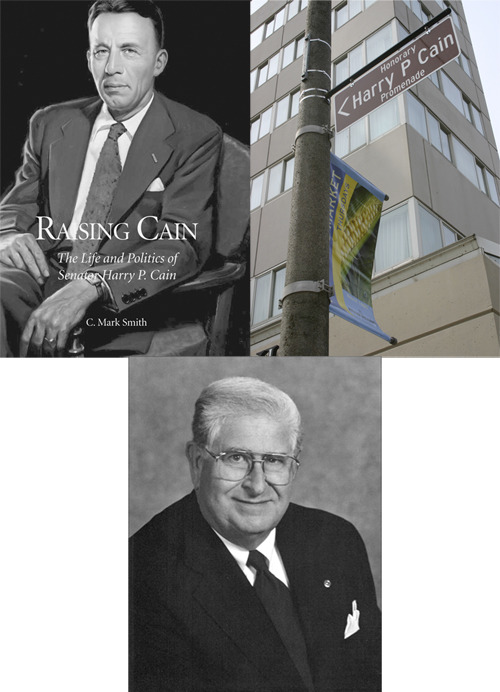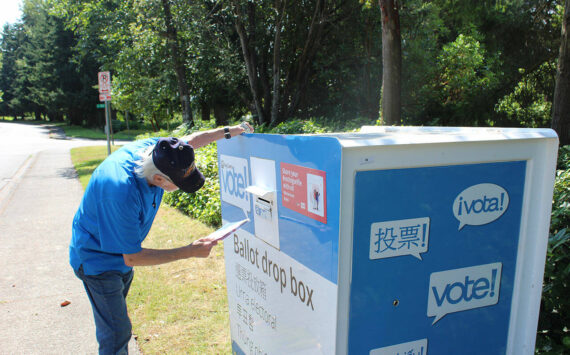It’s safe to say 2011 has been a good year for the legacy of former Tacoma Mayor and U.S. Senator Harry P. Cain.
In April, the City of Tacoma held a ceremony to officially rename the 1300 block of Broadway Plaza in downtown Tacoma the “Harry P. Cain Promenade,” recognizing his importance in the city’s history and on the national scene.
Also last month, author C. Mark Smith was at the Tacoma Public Library to celebrate and read from his new book “Raising Cain: The Life and Politics of Senator Harry P. Cain” ( http://www.raising-cain-book.com ). He also spoke to the Tacoma Historical Society during its 20th annual meeting on April 12.
Cain (1906-1979) was elected mayor of Tacoma in 1940, and again in 1942 for a four-year term. He took a leave of absence in May 1943 to enter the United States Army and served in the European theater between 1943 and 1945. He resumed his duties as mayor of Tacoma until 1946, when he was elected to the United States Senate. Later, Cain served on the Subversive Activities Control Board and became a noted advocate of civil liberties.
Long acquainted with Cain, Smith began research on his biography of Cain in July 2008, and has written two articles about Cain. The first appeared in “Arches,” University of Puget Sound’s alumni magazine, in the spring of 2009, and “Columbia,” the journal of the Washington State Historical Society. Smith is a graduate of Clover Park High School and a history graduate of the University of Puget Sound.
Smith recently discussed Cain’s life and the book he has written.
TACOMA DAILY INDEX: Why did you write ‘Raising Cain’?
C. MARK SMITH: There were several motivations. I knew Harry Cain from the late 1940s until his death in 1979. A larger-than-life figure to me when I was young, he became my mentor and, later in life, a casual correspondent. I wrote my senior graduation paper about his years on the Subversive Activities Control Board. When he died, his children and I decided to acknowledge his life by creating the Harry P. Cain Scholarship at the University of Puget Sound. In the years that followed I often thought about him as I pursued my own career or considered various important issues of the day. Second, his controversial career limited the recognition he received after his death. I believed that his remarkable story should be told. Finally, while history doesn’t exactly repeat itself, situations and our responses to them, do. I used the book, and Harry’s own words to address one of the important issues of our own day.
INDEX: What is that?
SMITH: I lived through the McCarthy era. Now, in the aftermath of 9/11 and with the nation again under attack, we are struggling with the same conflict between individual freedom and internal security that the nation faced in Harry Cain’s day. But today, there doesn’t seem to be anyone with a strong voice speaking out with a warning, like Cain did. In some small way, my book gives Cain his voice again. His warnings are as appropriate today as they where more than fifty years ago.
INDEX: How did Cain influence your own life and career?
SMITH: I owe my own interest in politics and public service to Harry Cain. I found myself adopting his flair for publicity and many of his pet phrases like “enlightened self-interest” and “let’s get cracking.” But he instilled more important concepts in me as well the importance of America’s role in the world, of keeping one’s word, and the importance of individual freedom and civil liberties. By the time he died in 1979, I had been involved in a congressional campaign and was serving as the director of the Western Regional Office of the federal Economic Development Administration covering the eight western states. I later went on to a forty-year career of managing economic development organizations at the federal, state, and local level.
INDEX: Who will want to read ‘Raising Cain’?
SMITH: I think that there are multiple audiences that should be interested in this book. It fills an important gap in the history of Tacoma and Washington State. But, more than that, Harry Cain spent his whole life in the thick of the action. He spent a year in England and Germany in the years leading up to World War II. He was a progressive young mayor of Tacoma dealing with the buildup to the war, vice and corruption, public housing and changing the city’s image. During the war, he held important military government jobs on the staffs of Dwight Eisenhower, Mark Clark and Matthew Ridgway. He participated in the landings at Salerno and fought in the Battle of the Bulge. He served a highly controversial term in the U.S. Senate. As a member of the Eisenhower Administration, he defied both his president and his party to oppose their loyalty-security program during the McCarthy era. He was a community leader and member of the Miami-Dade County Commission during the turmoil of the Civil Rights era and Viet Nam War. Readers who are interested in learning more about political courage and integrity, particularly on civil rights issues, will be drawn to Harry Cain, as I was.
INDEX: Why will a reader want to read ‘Raising Cain’?
SMITH: First and foremost, Cain’s is a very interesting story, with generous doses of humor, war and human tragedy, a liberal sprinkling of famous people, a wide sweep of locations around the world and, above all, a flawed but overpowering human spirit. Second, ‘Raising Cain’ would be great fiction, except that the story is true. We have an ordinary protagonist called to adventure. He is helped by a series of mentors and finds success, only to be severely tested by his enemies and allies alike. He overcomes personal defeat, but is given a second chance during which he makes his greatest contributions to society only to suffer another defeat. A third, unexpected, opportunity provides resurrection and closure to a long and active life.
INDEX: How did you research your biography of Cain?
SMITH: The key resources were the boxes of scrapbooks, letters, speeches and tape recordings held by Cain’s children. His office papers from his terms as mayor, U.S. Senator and member of the Subversive Activities Control Board are missing. Fortunately, Cain never met a reporter or a cameraman he didn’t like and his career was covered extensively by the press. Also, important Cain photographs and papers exist at the Tacoma Public Library and the Washington State Historical Society Research Center. Other materials were available from the Library of Congress, the National Archives and the Office of the Senate Historian, as well as from the Truman and Eisenhower presidential libraries. I knew the outline of his life story, but in my years of research for ‘Raising Cain’ I learned just how colorful, complicated and controversial a man Harry P. Cain was. The title, ‘Raising Cain’, is an apt description of the man.The book is exhaustively researched. It is based primarily on what others said about Cain and what he said about himself. I think the portrait is objective. I didn’t hide or intentionally cover up anything. I don’t know if everything he said about himself or what others said about him is true, but it is as accurate as I could make it.
INDEX: Why was Cain so politically inconsistent?
SMITH: I think there were four factors. The first was a personality that craved the limelight. He wanted to be at the center of action. The second was his lifelong belief in a set of personal core values. Chief among them was one promulgated by his philosophical mentor, Edmund Burke, when he said, “All that is necessary for the triumph of evil is for good men to do nothing.” The third was that Cain’s political views evolved from his life experiences and his interpretation of them. As an example, his business career and his objections to Franklin Roosevelt’s Second New Deal led him away from his Democratic roots. He became a Republican because they were willing to recruit him. He became a far-right Republican because of his war experiences and his desire for political change. Finally, there was a fourth factor. Cain was not a particularly good politician. He forgot to practice Burke’s admonition: “All government . . . and every prudent act, is founded on compromise and barter.” He was an excellent manager, but not a good compromiser.





